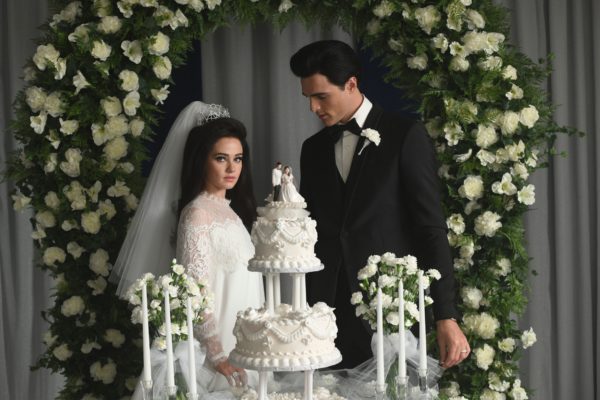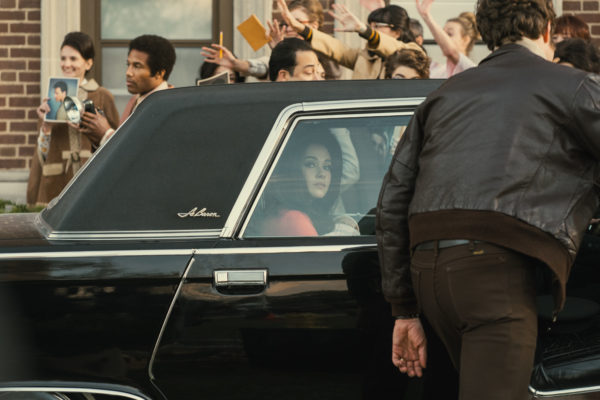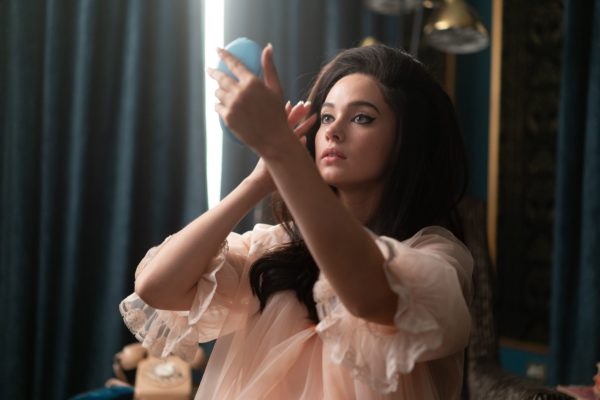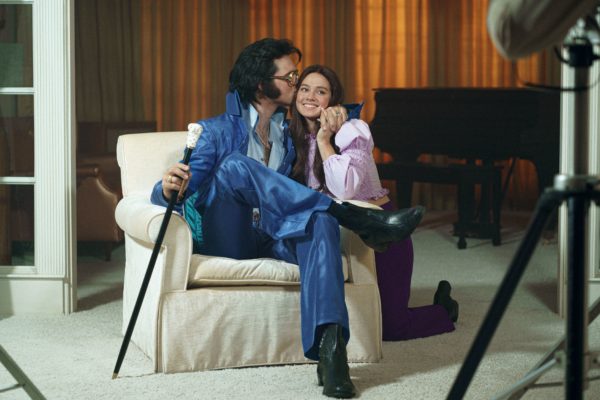
Sofia Coppola returns with a new take on Priscilla Presley’s life with Elvis in Priscilla (2023)
Based on the memoir Elvis and Me, Sofia Coppola‘s adaptation of Priscilla Presley‘s life with rock superstar Elvis Presley is something of a peculiar affair.
Simultaneously hindered by a story that was recently captured (albeit in far more sensational fashion) in Baz Lurhmann’s Elvis, Priscilla also relies heavily on its audience’s awareness of the King of Rock. The result is a film that never quite finds its footing.
The first act is the best. In 1959, seventeen year old Priscilla Beaulieu (Cailee Spaeny) is bored out of her mind living on an Army base in Berlin where her family has been stationed. When she’s spotted in a diner by a friend of Elvis’, Priscilla is invited to one of Elvis (Jacob Elordi)’ famed house parties – much to the chagrin of her father (Ari Cohen) and even moreso her mother, Ann (Dagmara Domińczyk).
It’s clear that the Captain and Ann have reservations, but they allow Priscilla to attend under the not-so-watchful eye of this man and his wife. So Priscilla goes, and listens to Elvis play the piano, then she accepts an invitation to his bedroom where they exchange a quick kiss…and Priscilla becomes infatuated.
Her obsession builds gradually – between a slow courtship (between both Priscilla and her begrudging parents) and beyond, when Elvis wraps up his time in Berlin and heads home to Graceland. Priscilla is still attending high school all this time, though her head (and doodles) are with Elvis. Even years after Elvis is gone and Ann pleads with Priscilla to move on, the teenage girl remains lovestruck, obsessing over tabloids of Elvis’ rumoured sexual liaisons and waiting for a phone call or a letter.

This will become a pattern in their relationship, which the film captures from courtship to (eventual) divorce. In this capacity, the film accurately captures the state of being so in love with someone that you’re barely living when they’re not around, even if you’re never truly appreciated when they are.
Priscilla anticipates that its audience is aware of basic facts about the couple/Elvis, though there are key moments captured for posterity, including a speedy marriage ceremony, the birth of daughter Lisa Marie (played by Raine Monroe Boland and Emily Mitchell at ages three and five respectively) and the period when Elvis was romantically linked to Ann Margaret while filming in LA.
The film both is and isn’t about Elvis; as evidenced by the title, Coppola is much more interested in how being with the King ultimately affects Priscilla. What began as a far-too-young affair turned into something of a conquest for Priscilla when she moves into Graceland and bears Elvis’ child, though he never truly settles down or commits to her.
Sidebar: The Colonel is a presence in the film, but unlike in Luhrmann’s film where he was played in over the top fashion by Tom Hanks, here he’s merely a specter that haunts the marriage: often present, but never seen.

The issue is that Coppola’s thesis is laid out early and often. It’s very clear that Priscilla has been swept up in a whirlwind romance with an older man who never truly appreciates or recognizes her as an equal. She’s merely another possession for him to covet and control. This is captured perfectly in the opening sequence which fetishistically frames Priscilla in such a way that she is never fully on screen: she’s a disembodied set of nails, make-up and feet, living in a gorgeous museum (or is it mausoleum?), filled with beautiful decorative items that are better suited for looking than touching.
Throughout the film, Priscilla’s status as a literal object of Elvis’ is repeated hammered home, even as she learns the dos and don’ts of the estate. It’s an isolating, overwhelming introduction that works well, in large part because Spaeny is often just required to look young and awestruck in the face of the opulent life she suddenly finds herself in.
But she’s not allowed to be a person. She can’t study on the lawn for fear of drawing attention to fans who clamour outside the gate; she’s not allowed to cavort with the office girls who answer Elvis’ fan mail, and – in my favourite sequence of the film – even her introductory dinner finds her outside of the conversation, simply listening in as everyone talks around her. She’s there simply to support Elvis; that means staying at home by the phone when he’s on tour, always be available to take his call when he needs emotional support.

As the famed singer, Elordi (wisely?) eschews imitating the King’s infamous drawl. Unfortunately the Aussie’s principal acting choice boils down to mumbling the King’s lines, which renders at least half of his dialogue nearly incomprehensible. Elvis also weirdly never loses his physique over the multiple decades Priscilla covers, which is perplexing considering the film’s avowed dedication to lovingly capturing both the clothes and the hairstyles of the times.
If nothing else, the film’s production and costume design team should be commended for doing most of the heavy lifting. The film is a sumptuous orgy of beautiful fabric and dresses from start to finish, though Priscilla’s shift to more modern hair styles happens seemingly overnight and is almost jarring.
As Priscilla, Spaeny has the challenge of aging from a naive teen to mature woman in the span of two hours. It’s a solid, if slightly unmemorable performance, principally because the narrative is wholly concerned with exploring Priscilla as a gilded bird trapped in Elvis and Graceland’s cage. As a result the film’s central protagonist never fully feels whole.

While yes, that’s the point, the result is that Priscilla remains as much a mystery to us as she is to herself. What does she want? Who is she without Elvis? The film ends on this same questioning note: Priscilla breaks free of her husband’s influence in the closing moments (not a spoiler), but the lack of insight into Priscilla herself leaves a gaping hole in the center of the film.
Therein lies the issue with the film: it’s all observation and no affect. Despite Spaeny’s best attempts to convey some kind of emotional journey for Elvis’ number one groupie, Priscilla never becomes a three-dimensional character. The whole movie is about her journey from enthralled teen to doting girlfriend to put-upon wife to liberated woman, but the thesis about how women lose themselves in the bright light of shitty men is clear from the opening moments. The film never builds to anything because it has nowhere else to go, which makes for a flat, almost uneventful viewing experience.
Priscilla is beautiful, and several sequences perfectly capture the essence of what Coppola is seeking to explore. Still, as a character study, it almost would have played better as a short. As it stands, Priscilla is a gorgeous, albeit emotionally inert film, which isn’t something you expect to say about a Sofia Coppola picture. 3/5
Priscilla is in theaters Nov 3.
The problem with the movie is that it stops at the wrong moment in Priscilla’s life. There are 50 years uncovered, starting with her Dallas period, the Edwards period (with what that meant for Lisa), then the birth of Navarone, her Naked Gun years and lastly the opening of Graceland, which is her greatest contribution, having garnered, as it has, 2.24 billion to the Memphis economy since it opened in 1982. She is the reason 22 million people, from Heads of State, and of Government, to Princes and future Kings, Nobel Prize laureates or not, and just about any person, of sundry professions, decides to go out of their way to tour Graceland. But does the movie acknowledge that?